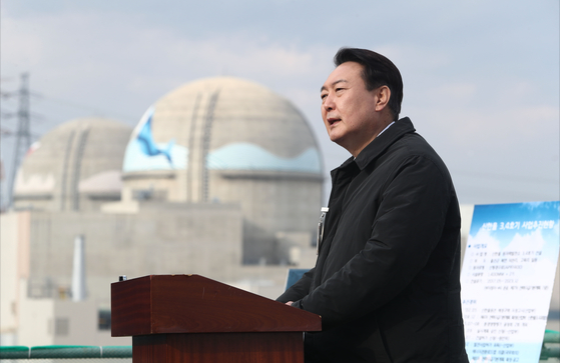
In the past, President Yoon Seok-yul openly expressed his support for the construction of new nuclear power plants in Korea. In his presidential campaign, Yoon promised that he would take a pragmatic approach to reaching nationwide carbon neutrality and develop South Korea into a nuclear energy superpower.
The Yoon administration’s new plans starkly contrast with the stance of the previous administration, led by former president Moon Jae-in, and align more with the Lee Myung-bak administration from 2008.
The Lee administration’s policies included South Korea’s first target regarding greenhouse gas reductions, which planned to increase the share of nuclear energy to 59% of the country’s total energy production by 2030. The Moon government canceled this plan and introduced a nuclear phase-out policy at the start of Moon’s term in 2017, impacted by the Fukushima nuclear disaster in Japan and the global trend toward carbon neutrality. Moon’s policy aimed to shut down the two oldest nuclear power plants that were in operation as well as an additional seven nuclear power plants by 2030. Meanwhile, a heavier emphasis was placed on the incorporation of renewable energy, expanding its share to 30.2% of total energy production by the same year.
Yoon’s latest goals aim to tilt towards green energy with an emphasis on nuclear power. On January 11th, the Ministry of Trade, Industry, and Energy established the 10th Basic Plan for Long-Term Electricity Supply and Demand, which aims to have nuclear energy taking up 32.4% of South Korea’s energy mix by 2030, and 34.6% by the year 2036, up from 27% in 2020.
The latest plan aims to increase renewable energy whilst simultaneously decreasing the usage of fossil fuels, therefore reducing the usage of coal within the nation to under 15% of the nation’s energy mix by 2036. Furthermore, the administration approved the plans to build two more nuclear power plants, Shin-Hanul 3 and 4, on June 12th during the 73rd meeting of the Power Development Project Promotion Committee. In conjunction with three other nuclear power plants that are already under construction, the total number of nuclear power plants in Korea will increase from 25 to 30 by 2033. Additionally, the administration plans to extend the service life of 10 existing nuclear power plants.
Another reason South Korea is looking to develop nuclear power plants is to bolster their energy security and to meet climate goals, despite ranking No. 5 in the world in terms of its nuclear power capacity. The Russo-Ukrainian conflict acted as a wake-up call for nations worldwide to invest in domestic power sources, as Russia is a large exporter of oil, natural gas, and coal. With 98% of Korea’s fossil fuel supply relying on exports, the nation may suffer an economic decline if such exports were to come to a halt. This is also because Korea is a nation that is heavily reliant on energy to maintain its global manufacturing industry.
Korea is also in dire need of an alternative to fossil fuels in order to meet its climate goals. Korea is far behind other nations in the race to a complete sustainable energy conversion. Korea’s renewable energy in the year 2021 was a meager 6% of its energy mix – the lowest among all nations within the Organization for Economic Cooperation and Development.
The Korean population has also grown to support the use of nuclear power. In a poll conducted in 2017, in regards to the construction of two power plants, Shin-Kori 5 and 6, 53.2% of respondents had stated that nuclear energy should be reduced. That number significantly declined to 28.1% in another poll conducted by the Korean Nuclear Society in 2021, with 71.2% of respondents supporting of nuclear energy. A further 69.2% of individuals believed that nuclear energy was necessary in a poll conducted in 2022. The shift in public opinion is likely due to the increase in electricity prices caused by the reliance on imports of energy sources as well as the Russo-Ukrainian war.
Concerns surrounding nuclear energy are still quite real, spanning from its potential environmental hazards in the case of accidents or when discarding radioactive waste, as seen in both Chernobyl and Fukushima.
Still, experts believe that nuclear power plants are a sustainable alternative to fossil fuels, as nuclear power emits close to no greenhouse gasses into the atmosphere.
“Nuclear power is the only carbon-free energy source we have that can deliver large amounts of power day and night through every season almost anywhere on earth,” said Bill Gates, an avid supporter of nuclear energy, during the 2021 Nuclear Energy Assembly (NEA).
According to four of the world’s leading climate scientists, Kenneth Caldeira, Kerry Emanuel, James E. Hansen and Tom Wigley, in a letter to environmentalists, “there is no credible path to climate stabilization that does not include a substantial role for nuclear power.”